Does Rinsing with Water Save Plants from Roundup Spray?
Roundup is a popular herbicide commonly used to kill weeds and other plants by gardeners and farmers. However, spraying it on plants accidentally can severely harm or even kill them. In such cases, gardeners often wonder whether rinsing the plants with water can save them from Roundup spray. In this article, we will explore this question and try to find an answer.
The Science Behind Roundup Spray
Roundup is a systemic herbicide containing glyphosate, which is absorbed by plants and transported throughout the plant's system. Once absorbed, it interferes with the plant's metabolism, preventing it from making proteins necessary for growth. This leads to the eventual death of the plant. Glyphosate in Roundup is also known to be harmful to humans and animals, and therefore, it's important to follow safety guidelines while using Roundup.
Can Rinsing with Water Save Plants from Roundup Spray?
Rinsing contaminated plants with water can help remove excess Roundup from the plant's surface, but it may not be effective at saving the plant if the herbicide has already been absorbed by the plant. Glyphosate is a systemic herbicide and can be transported throughout the plant, affecting all parts of it. Therefore, spraying Roundup on the leaves of a plant would not only impact the leaves but also the stem, roots, and eventually the entire plant.
Additionally, rinsing contaminated plants with water may be helpful only in cases where the Roundup spray is washed from the surface before it has a chance to be fully absorbed. If the herbicide has already been absorbed, rinsing the plant won't help flush out the chemical from the plant's system.
What to do if your Plants have been Sprayed by Roundup?
If you accidentally spray Roundup on your plants, there are a few things you can do to minimize the damage:
Remove the spray residue from the leaves as soon as possible using a clean cloth or paper towel.
Rinse the plant thoroughly with water, but be careful not to overwater as this may wash the herbicide into the soil and affect the plant's roots.
Trim off the damaged or affected parts of the plant using clean and sterilized pruners.
Apply a plant stimulant or growth promoter to help the plant recover from stress.
It's important to note that the effectiveness of these remedies may depend on several factors such as the amount of Roundup sprayed, the type of plant and its health, and the extent of damage already done. Therefore, it's always better to take preventive measures and follow safety guidelines while using any herbicides or chemicals.
Conclusion
While rinsing contaminated plants with water may help in removing excess Roundup from the plant's surface, it may not be effective in saving the plant from the herbicide's harmful effects if it has already been absorbed by the plant. Preventive measures such as following safety guidelines, spraying herbicides only on weeds, and being cautious while spraying near plants can help avoid damaging plants. In case of contamination, it's essential to act fast, remove excess spray, and rinse the plant with water but also trim off the affected parts, and apply a plant stimulant or growth promoter for the best chance of recovery.

 how many times do yo...
how many times do yo... how many planted tre...
how many planted tre... how many pine trees ...
how many pine trees ... how many pecan trees...
how many pecan trees... how many plants comp...
how many plants comp... how many plants can ...
how many plants can ... how many plants and ...
how many plants and ... how many pepper plan...
how many pepper plan...






























